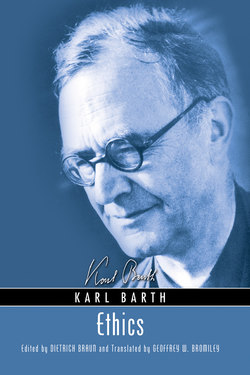Отрывок из книги
KARL BARTH
ETHICS
.....
This objection necessarily starts already with the definition of God as the supreme being. For where and how is God knowable and given to us in his being and not in and as his act? If the God grasped in his being is an entity that man can master, with what right does this entity deserve to be called God? Is not this ambiguity suspiciously betrayed in the idea that on the assumption of a natural source of knowledge there is a partial and quantitative knowledge of God whose object is, e.g., the personality and not the triunity of God, ⌜creation and not reconciliation⌝? Does man really know God when he admittedly does not know him totally, in his nature, as the Lord in the pregnant ⌜and comprehensive⌝ biblical sense of the term? Is not metaphysics viewed as a basic discipline superior to both philosophy and theology, a relapse into apologetics in which both theology and philosophy can only lose their true origin and subject matter? As is well known, even the theology of the early church was to a large extent apologetically oriented. Later, of course, the Roman Catholic teaching on principles became infinitely more assured and refined. But when we measure it by the measure of what is described as the knowledge of God in the biblical documents, we are forced to regard it as a deviation in which we cannot participate. |
For this reason the construction of the order of moral obligation on the order of being is also for us an impermissible beginning. From what standpoint can we men verify this construction? When we who are not God but men accomplish this derivation of obligation from being, does it not entail a weakening and indeed a destroying of obligation as such? If there is a divinely ordered obligation, how can it be grounded for us except in itself? Does not its command have to be one and the same as the divine act of commanding; indeed, as the divine commanding itself? How can we look beyond this to an underlying divine being, and if we do, have we taken it seriously as obligation? |
.....
